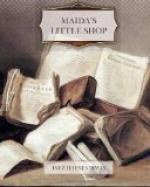Granny looked, as Dr. Pierce afterwards said, “as tickled as Punch.”
“How do you like shop-keeping?” Dr. Pierce went on.
“Like it!” Maida plunged into praise so swift and enthusiastic that Dr. Pierce told her to go more slowly or he would put a bit in her mouth. But he listened attentively. “Well, I see you’re not tired of it,” he commented.
“Tired!” Maida’s indignation was so intense that Dr. Pierce shook until every curl bobbed.
“And I get so hungry,” she went on. “You see I have to wait until two o’clock sometimes before I can get my lunch, because from twelve to two are my busy hours. Those days it seems as if the school bell would never ring.”
“Sure, tis a foine little pig OI’m growing now,” Granny said.
“And as for sleeping—” Maida stopped as if there were no words anywhere to describe her condition.
Granny finished it for her. “The choild sleeps like a top.”
Billy Potter came at least every day and sometimes oftener. Every child in Primrose Court knew him by the end of the first week and every child loved him by the end of the second. And they all called him Billy. He would not let them call him Mr. Potter or even Uncle Billy because, he said, he was a child when he was with them and he wanted to be treated like a child. He played all their games with a skill that they thought no mere grown-up could possess. Like Rosie, he seemed to be bubbling over with life and spirits. He was always running, leaping, jumping, climbing, turning cartwheels and somersaults, vaulting fences and “chinning” himself unexpectedly whenever he came to a doorway.
“Oh, Masther Billy, ’tis the choild that you are!” Granny would say, twinkling.
“Yes, ma’am,” Billy would answer.
At the end of the first fortnight, the neighborhood had accepted Granny and Maida as the mother-in-law and daughter of a “traveling man.” From the beginning Granny had seemed one of them, but Maida was a puzzle. The children could not understand how a little girl could be grown-up and babyish at the same time. And if you stop to think it over, perhaps you can understand how they felt.
Here was a child who had never played, “London-Bridge-is-falling-down” or jackstones or jump-rope or hop-scotch. Yet she talked familiarly of automobiles, yachts and horses. She knew nothing about geography and yet, her conversation was full of such phrases as “The spring we were in Paris” or “The winter we spent in Rome.” She knew nothing about nouns and verbs but she talked Italian fluently with the hand-organ man who came every week and many of her books were in French. She knew nothing about fractions or decimals, yet she referred familiarly to “drawing checks,” to gold eagles and to Wall Street. Her writing was so bad that the children made fun of it, yet she could spin off a letter of eight pages in a flash. And she told the most wonderful fairy-tales that had ever been heard in Primrose Court.




